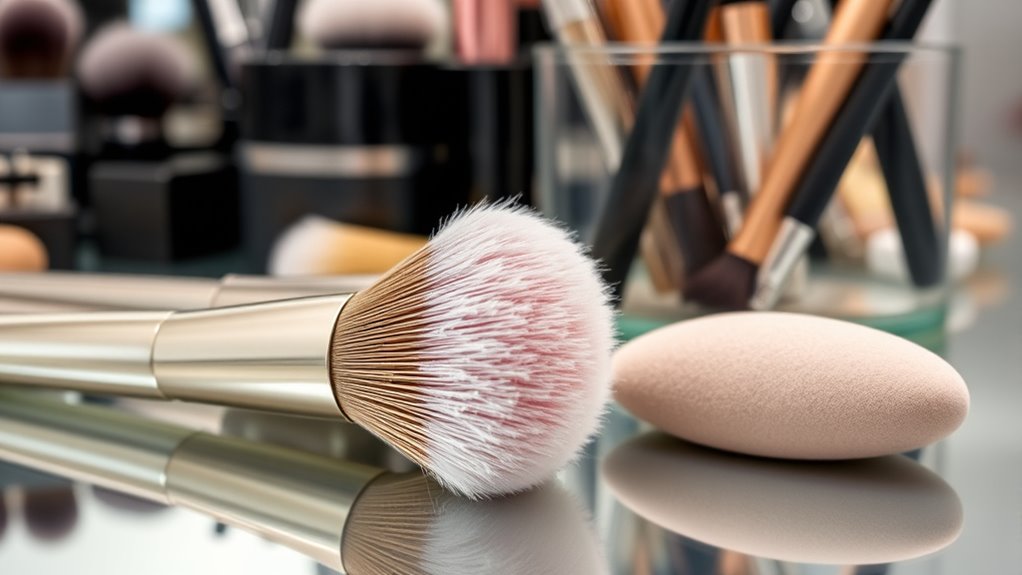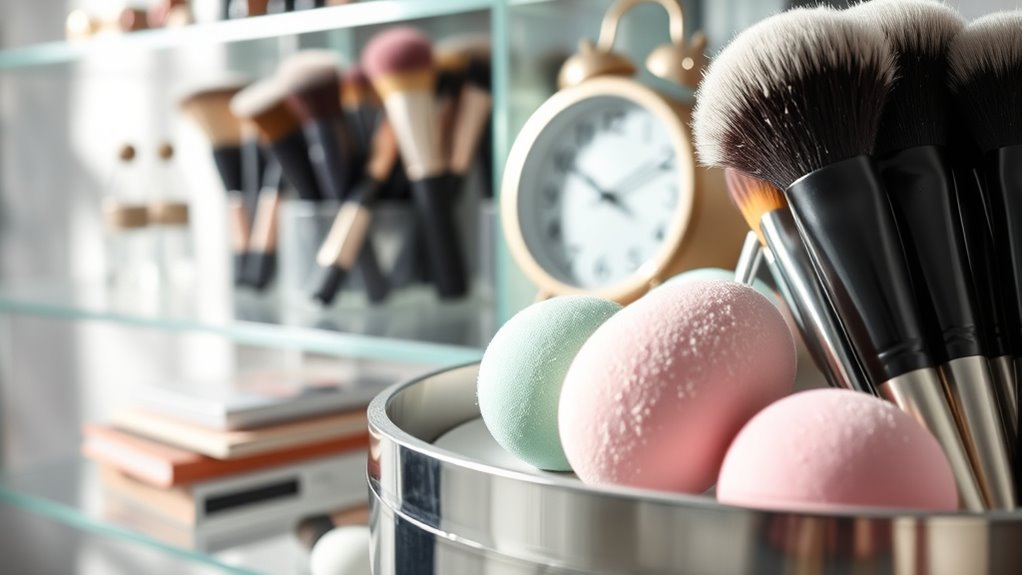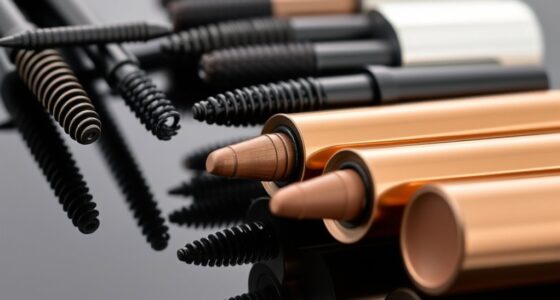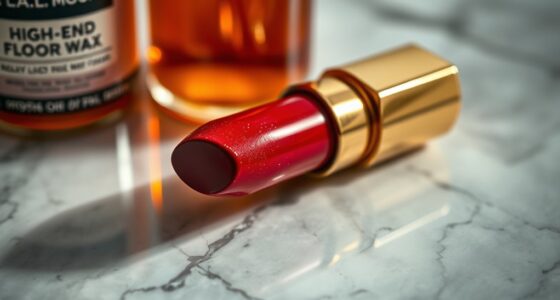To maintain good makeup hygiene, you should clean your brushes weekly with gentle cleansers to remove bacteria and buildup, and soak sponges in warm water with soap or a sponge cleaner, then let them air dry thoroughly. Keep an eye on your products’ shelf life—most last 3 to 6 months—and replace expired ones to avoid skin issues. Proper cleaning and maintenance extend tool life and keep your skin healthy, so learn more to keep your routine safe and effective.
Key Takeaways
- Clean brushes weekly with gentle cleanser to prevent bacteria buildup and maintain skin health.
- Soak and rinse sponges thoroughly; deep clean by microwaving damp sponges for 30 seconds.
- Replace makeup products every 3–6 months to avoid bacterial contamination and ensure product efficacy.
- Inspect tools regularly for damage to prevent skin irritation and prolong their lifespan.
- Store tools in clean, dry places and avoid water contact with ferrules to prevent shedding and mold growth.

Good makeup hygiene is vital for maintaining healthy skin and preventing infections. When you think about your makeup tools, it’s easy to overlook how much bacteria can accumulate on brushes and sponges over time. Removing bacteria buildup is essential because dirty tools can harbor germs, oils, and dead skin cells that may cause breakouts or skin irritation. To keep your tools clean, you need to adopt proper cleaning techniques that effectively eliminate bacteria without damaging your brushes or sponges.
Start by washing your brushes regularly—at least once a week is ideal. Use a gentle cleanser or a specific brush cleaner, and work it into the bristles with lukewarm water. Be careful to avoid getting water into the ferrule (the metal part holding the bristles), as this can loosen the glue and cause shedding. Rinse thoroughly until the water runs clear, then gently squeeze out excess water and reshape the brush heads. Allow them to air dry flat on a clean towel. Proper cleaning techniques like this ensure that all makeup residue, oils, and bacteria are removed, reducing the risk of skin issues. Regularly inspecting your tools for wear and tear can also help prevent damage that might compromise hygiene.
Washing brushes weekly with gentle cleanser prevents bacteria buildup and skin issues.
For sponges, the cleaning process is just as important. Sponges tend to trap more bacteria because of their porous nature, making them a potential breeding ground for germs if not cleaned properly. To clean sponges, soak them in warm water mixed with a gentle soap or a specialized sponge cleaner. Squeeze and massage the sponge to work out makeup and dirt, then rinse thoroughly under running water. For deep cleaning, you can microwave a damp sponge for about 30 seconds—just make sure it’s wet to avoid a fire hazard. Always let your sponges air dry completely before storing them. This routine not only keeps bacteria at bay but also prolongs the lifespan of your tools.
Shelf life is another important aspect of makeup hygiene. Makeup products, especially liquids and creams, have a limited lifespan, often between three to six months. Using expired makeup can introduce bacteria into your skin, leading to breakouts or infections. Check your products regularly for changes in texture, smell, or color—these are signs it’s time to toss them out. Keeping your tools clean and replacing expired products are simple steps that greatly improve your makeup routine’s hygiene. Being aware of product shelf life helps in maintaining a safe and effective makeup routine.
Frequently Asked Questions
How Can I Tell if My Makeup Brushes Need Replacing?
You can tell your makeup brushes need replacing if you notice brush bristle deterioration, like shedding or fraying, or if the bristles no longer hold their shape. Also, check for handle contamination, such as discoloration or gunk buildup around the handle or ferrule. If cleaning doesn’t remove buildup or the bristles become stiff or sparse, it’s time to substitute them to guarantee hygienic application and avoid skin issues.
Are Natural or Synthetic Brushes More Hygienic?
Natural brushes, made from animal hair, often harbor more bacteria due to their porous nature, making them less hygienic than synthetic brushes. Synthetic brushes, crafted from nylon or polyester, meet higher hygiene standards because they are non-porous and easier to clean thoroughly. If hygiene is your priority, opt for synthetic brushes, especially for liquid or cream products, as they reduce bacteria buildup and are simpler to maintain.
Can Dirty Sponges Cause Skin Infections?
Dirty sponges are like breeding grounds for bacteria, increasing your risk of skin infections. They trap moisture and makeup, creating a cozy environment for bacterial growth. When you use a contaminated sponge, you expose your skin to contamination risks that can lead to breakouts, irritation, or worse. To keep your skin safe, wash your sponges regularly and replace them every few months. Clean sponges are your first line of defense against skin problems.
How Often Should I Disinfect My Makeup Tools?
You should sterilize your makeup tools at least once a week to prevent bacteria buildup. Use proper sanitization techniques like brush cleaning tips—soak brushes in gentle cleansers or brush sanitizers, then rinse thoroughly. For sponges, wash after each use with mild soap, and disinfect weekly with alcohol or a dedicated sponge cleaner. Regular cleaning keeps your skin healthy and ensures your makeup applies smoothly.
What’s the Best Way to Store Makeup Brushes?
Imagine you’re back in the days of Marie Antoinette—your makeup tools deserve royal treatment! To store your brushes, keep them upright in a clean, ventilated container to prevent dust and bacteria. For travel storage, opt for a sturdy, separate case to protect your brushes from damage and contamination. Remember, regular brush cleaning is essential, and proper storage prolongs their lifespan and maintains hygiene.
Conclusion
Remember, maintaining your makeup tools is like tending a garden—you nurture them to keep beauty blooming and germs at bay. Regular cleaning and mindful shelf life extend their life, ensuring your skin stays radiant and healthy. Think of your brushes and sponges as loyal allies, like knights guarding your glowing throne. Treat them with care, and they’ll serve you well, transforming your routine into a ritual of hygiene and beauty that shines brighter than any star.









